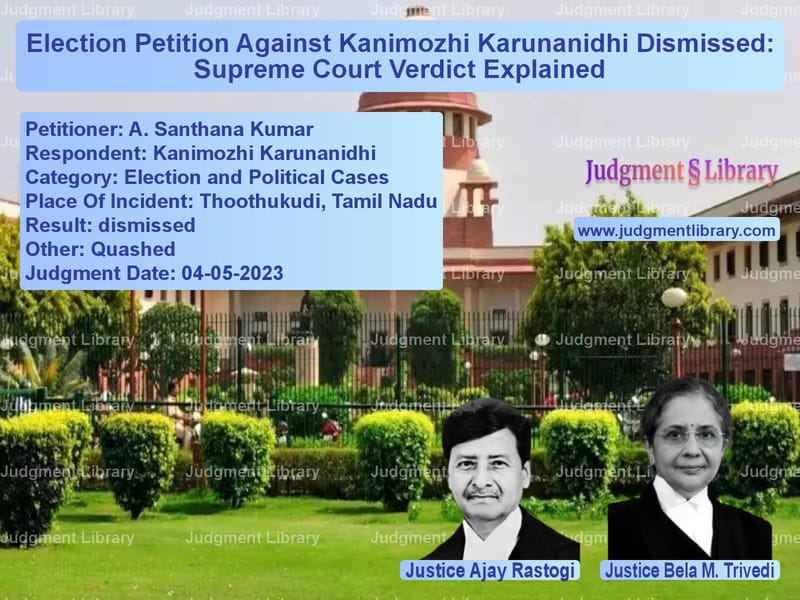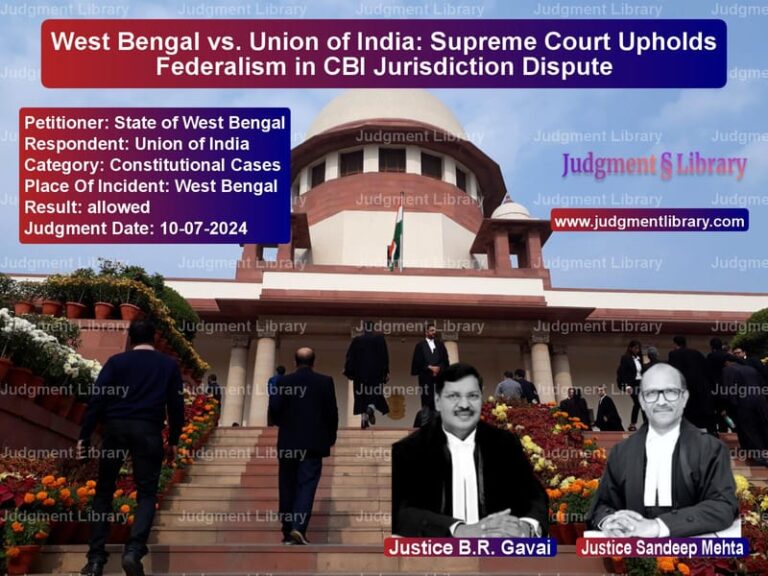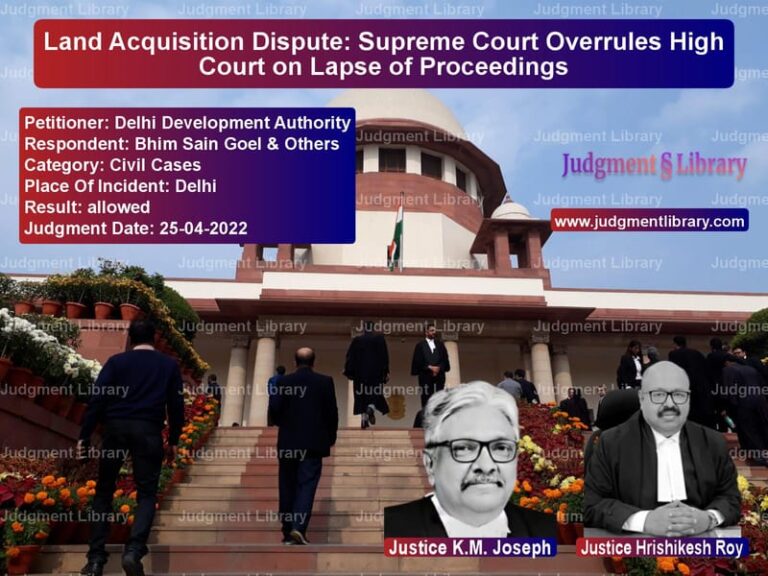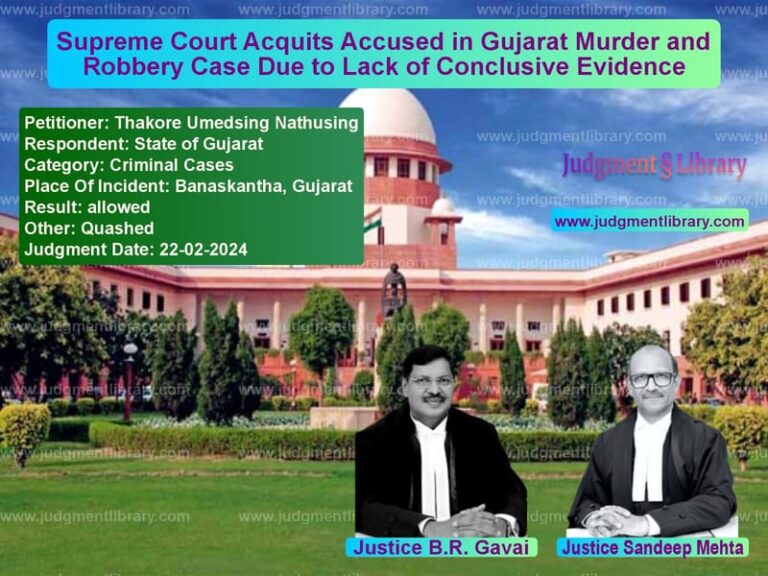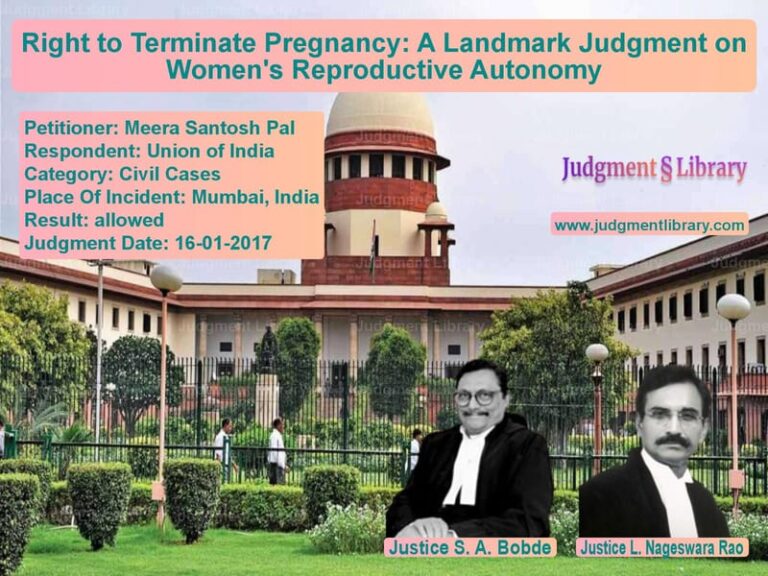Election Petition Against Kanimozhi Karunanidhi Dismissed: Supreme Court Verdict Explained
The Supreme Court of India, in the case of Kanimozhi Karunanidhi vs. A. Santhana Kumar & Others, delivered a crucial verdict regarding the validity of an election petition filed against the appellant, challenging her election to the 17th Lok Sabha from Thoothukudi constituency. The case revolved around allegations of non-disclosure of income tax details of her spouse in the affidavit submitted during the nomination process. The Supreme Court dismissed the election petition on the ground that it lacked material facts necessary to constitute a valid cause of action under the Representation of the People Act, 1951 (RP Act).
Background of the Case
Kanimozhi Karunanidhi, a candidate from the 36-Thoothukudi Lok Sabha Constituency in the 2019 General Elections, won the election with a margin of 3,47,209 votes. After the election results, A. Santhana Kumar, claiming to be a voter, filed an election petition under Section 100(1)(d)(iv) of the RP Act, 1951, seeking to declare the election void on the ground that the appellant had failed to disclose the income tax details of her spouse in Form 26, as required under Rule 4A of the Conduct of Election Rules, 1961.
The petitioner alleged that by omitting the income tax details of her spouse, the returned candidate had intentionally suppressed vital information from the voters, thereby violating the requirements under Article 324 of the Constitution and the RP Act.
Allegations Made in the Election Petition
The election petitioner argued that:
- The appellant failed to provide the Permanent Account Number (PAN) and the last financial year of income tax return filing details of her spouse.
- The omission of these details was a deliberate suppression of material facts that prevented voters from making an informed choice.
- Such non-disclosure constituted a violation of Rule 4A of the Conduct of Election Rules, 1961, which mandated full disclosure of income tax details of candidates and their spouses.
- Non-compliance with these rules materially affected the election result, making it void under Section 100(1)(d)(iv) of the RP Act.
Arguments by the Appellant
Kanimozhi Karunanidhi, through her counsel, contended that:
- The election petition lacked material facts necessary to constitute a valid cause of action.
- The allegations were vague and based on assumptions rather than concrete evidence.
- Section 83(1)(a) of the RP Act required an election petition to contain a concise statement of material facts, which the petitioner failed to provide.
- The candidate had disclosed all relevant details in Form 26, and if a particular column was not applicable, leaving it blank did not amount to suppression of facts.
- The Returning Officer had scrutinized and accepted the nomination, and no objections were raised at that stage.
Key Observations by the Supreme Court
The Supreme Court, after examining the election petition and arguments, made the following key observations:
1. Material Facts Must Be Stated
The Court reiterated that an election petition must contain a complete set of material facts necessary to constitute a cause of action. It observed:
“Material facts are those facts upon which a party relies for its claim or defense. Failure to state even a single material fact would render the election petition liable for dismissal.”
2. Non-Disclosure Must Be Substantial
The Court held that an election can only be set aside if the alleged non-disclosure was substantial and had a material impact on the election result. It found that the petitioner had not demonstrated how the alleged non-disclosure of the appellant’s spouse’s income tax details affected the election outcome.
Read also: https://judgmentlibrary.com/supreme-court-upholds-open-ballot-system-in-rajya-sabha-elections/
3. No Violation of Election Laws
The Court noted that the appellant had filled out Form 26 correctly and provided all relevant information. The alleged missing details were not required by law, and there was no violation of the RP Act or Conduct of Election Rules.
4. Scrutiny by Returning Officer
The Supreme Court emphasized that the Returning Officer had scrutinized the nomination and found no defects. It stated:
“If the nomination was accepted after due scrutiny and no objections were raised at that time, a later challenge based on vague allegations cannot be sustained.”
Conclusion
Based on the above findings, the Supreme Court dismissed the election petition, stating that it failed to disclose a valid cause of action. The judgment reinforced the principle that election petitions must be backed by substantive material facts and cannot be entertained based on vague or incomplete allegations.
The ruling has significant implications for election disputes, emphasizing the need for clarity, specificity, and adherence to legal requirements when challenging an election result.
Petitioner Name: A. Santhana Kumar.Respondent Name: Kanimozhi Karunanidhi.Judgment By: Justice Ajay Rastogi, Justice Bela M. Trivedi.Place Of Incident: Thoothukudi, Tamil Nadu.Judgment Date: 04-05-2023.
Don’t miss out on the full details! Download the complete judgment in PDF format below and gain valuable insights instantly!
Download Judgment: a.-santhana-kumar-vs-kanimozhi-karunanidh-supreme-court-of-india-judgment-dated-04-05-2023.pdf
Directly Download Judgment: Directly download this Judgment
See all petitions in Public Interest Litigation
See all petitions in Legislative Powers
See all petitions in Constitution Interpretation
See all petitions in Judgment by Ajay Rastogi
See all petitions in Judgment by Bela M. Trivedi
See all petitions in dismissed
See all petitions in Quashed
See all petitions in supreme court of India judgments May 2023
See all petitions in 2023 judgments
See all posts in Election and Political Cases Category
See all allowed petitions in Election and Political Cases Category
See all Dismissed petitions in Election and Political Cases Category
See all partially allowed petitions in Election and Political Cases Category

